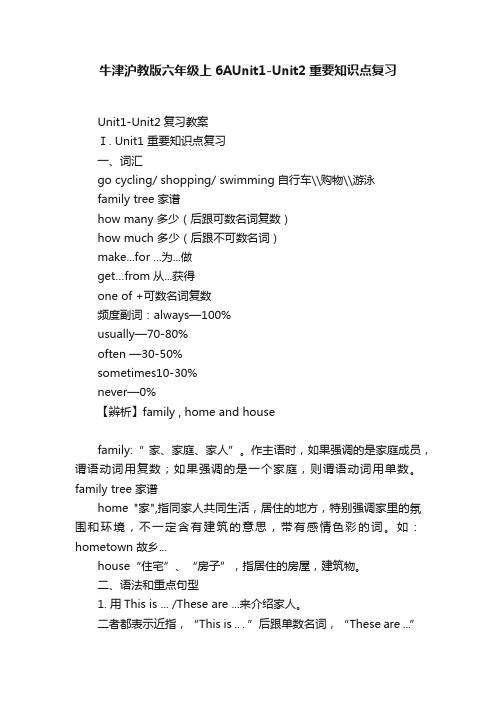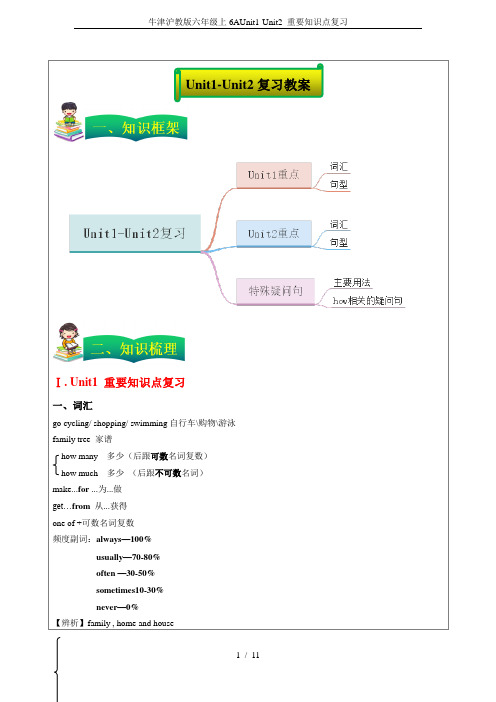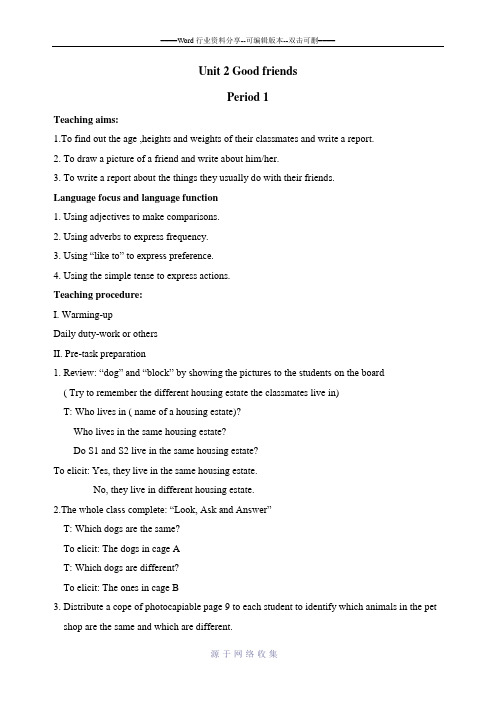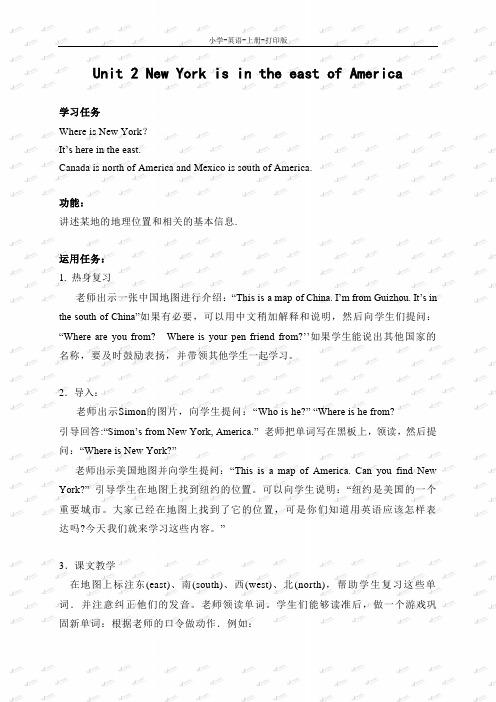预备词组6AModule1Unit2
牛津沪教版六年级上6AUnit1-Unit2重要知识点复习

牛津沪教版六年级上6AUnit1-Unit2重要知识点复习Unit1-Unit2复习教案Ⅰ. Unit1 重要知识点复习一、词汇go cycling/ shopping/ swimming自行车\\购物\\游泳family tree 家谱how many 多少(后跟可数名词复数)how much 多少(后跟不可数名词)make...for ...为...做get…from从...获得one of +可数名词复数频度副词:always—100%usually—70-80%often —30-50%sometimes10-30%never—0%【辨析】family , home and housefamily:“ 家、家庭、家人”。
作主语时,如果强调的是家庭成员,谓语动词用复数;如果强调的是一个家庭,则谓语动词用单数。
family tree 家谱home "家",指同家人共同生活,居住的地方,特别强调家里的氛围和环境,不一定含有建筑的意思,带有感情色彩的词。
如:hometown 故乡...house“住宅”、“房子”,指居住的房屋,建筑物。
二、语法和重点句型1. 用This is ... /These are ...来介绍家人。
二者都表示近指,“This is .. . ”后跟单数名词,“These are ...”后跟复数名词或者多个不同的对象。
2.用how many 来询问数量后接可数名词的复数形式,当我们提问你有多少……时候,如果How many后跟人,常用how many... do you have?如果How many 后跟物,常用how many...have you got?3.What do you do with your... ? 和What else do you do with your... ? 来提问与家庭成员或亲戚一起做什么.else 意为别的其他的,常用于特殊疑问词或不定式之后,如what else, something else等。
牛津沪教版六年级上6AUnit1-Unit2 重要知识点复习

Unit1-Unit2复习教案Ⅰ. Unit1 重要知识点复习一、词汇go cycling/ shopping/ swimming自行车\购物\游泳family tree 家谱how many 多少(后跟可数名词复数)how much 多少(后跟不可数名词)make...for ...为...做get…from从...获得one of +可数名词复数频度副词:always—100%usually—70-80%often —30-50%sometimes10-30%never—0%【辨析】family , home and housefamily:“ 家、家庭、家人”。
作主语时,如果强调的是家庭成员,谓语动词用复数;如果强调的是一个家庭,则谓语动词用单数。
family tree 家谱home "家",指同家人共同生活,居住的地方,特别强调家里的氛围和环境,不一定含有建筑的意思,带有感情色彩的词。
如:hometown 故乡...house“住宅”、“房子”,指居住的房屋,建筑物。
二、语法和重点句型1. 用This is ... /These are ...来介绍家人。
二者都表示近指,“This is .. . ”后跟单数名词,“These are ...” 后跟复数名词或者多个不同的对象。
2.用how many 来询问数量后接可数名词的复数形式,当我们提问你有多少……时候,如果How many后跟人,常用how many... do you have?如果How many 后跟物,常用how many...have you got?3.What do you do with your... ? 和What else do you do with your... ? 来提问与家庭成员或亲戚一起做什么.else 意为别的其他的,常用于特殊疑问词或不定式之后,如what else, something else等。
沪教版牛津小学英语6A-Module1-Unit2-period1

Unit 2 Good friendsPeriod 1Teaching aims:1.To find out the age ,heights and weights of their classmates and write a report.2. To draw a picture of a friend and write about him/her.3. To write a report about the things they usually do with their friends.Language focus and language function1. Using adjectives to make comparisons.2. Using adverbs to express frequency.3. Using “like to” to express preference.4. Using the simple tense to express actions.Teaching procedure:I. Warming-upDaily duty-work or othersII. Pre-task preparation1. Review: “dog” and “block” by showing the pictures to the students on the board( Try to remember the different housing estate the classmates live in)T: Who lives in ( name of a housing estate)?Who lives in the same housing estate?Do S1 and S2 live in the same housing estate?To elicit: Yes, they live in the same housing estate.No, they live in different housing estate.2.The whole class complete: “Look, Ask and Answer”T: Which dogs are the same?To elicit: The dogs in cage AT: Which dogs are different?To elicit: The ones in cage B3. Distribute a cope of photocapiable page 9 to each student to identify which animals in the pet shop are the same and which are different.III. While-task procedure1. Play the recording: Look and Read Students listen and follow in their books.2. Play the recording again Students listen and repeat3. Give the students a few minutes to read the passage silently.4. Ask the students to read the five sentences in Answer True/false.5. Tell the students to close their booksT: Who is your good friend?How old is he/she?What do you like to do together?To elicit: _________is my good friend. He /She is _______ yeas old. We always /usually /sometimes ________ together.6. Distribute a copy of Photocopiable page 10 to each student to tick the things they and theirfriends do together. Then they write them in complete sentencesIV. Consolidation:Grammar practice Book A Page 4-5.。
沪教版小学牛津英语6A Module1Unit2

●
gets angry
1 2 3 4 5 6 7 8
Listen and write
Alice is my good friend. She is always friendly _______ andhelpful ______. works She always______ hard She is never ____. late for school. ______ never She ______ gets angry. Kitty is my good friend. kind She is always ________ to others. She always shares her _______ with food me. She is never naughty ________. She never tells lies ___________.
8-5 John likes reading English books . ● He likes English very much and he always gets 取得) (取得)an A in English tests(测试 测试). 测试 ● Do you want to be his friend? ● Why or why not?
●
works hard
1 2 3 4 5 6 7 8
8-6 Jim always plays games and doesn’t work hard at school. ● He usually goes to school very late(晚). 晚 ● Do you like to be his friend? ● Why or why not?
Module 1 Unit 2词组及句子

Module 1 Unit 2 Our animals friends词组及句子1.visit sp = see sp 参观某地2.welcome to sp 欢迎来到某地3.leave sb / sth 离开(遗弃) 某人/物4.leave sp 离开某地5.leave for sp 出发去某地6.leave A for B 离开A地去B地7.in / on the street /road 在路上8.take sb to sp 带某人去某地9.bring sb to sp 带某人来某地10.keep sb /sth 收留某人/ 饲养某物11.prefer A to B = like A better than B 比起B来更喜欢A12.give sb sth / sth to sb 给某人某物13.dog food for puppies / little dogs 适合小狗吃的狗粮14.hold sb / sth carefully 小心翼翼地托起某人/物15.take sb for a walk 带某人去散步16.need (to) do sth 需要干某事17.need sth 需要某物18.buy sb sth / sth for sb 给某人买某物19.be unkind to sb 对某人不友善20.be kind /friendly to sb 对某人友善的21.save sb from sth 挽救某人免于发生某事22.save sb from danger 挽救某人免于发生危险23.prevent sb (from) doing sth 预防(妨碍)某人干某事24.help sb (to) do sth 帮助某人干某事25.help sb with sth 在某事上帮助某人26.promise to do sth 发誓干某事27.sick animals 生病的动物28.ask sb to do sth 要求某人干某事29.make a display 做一个展示30.make sb sth / sth for sb 为某人制作某物31.keep sb from sth = protect sb from sth 保护某人免于遭受某事32.keep sb from doing sth 阻止某人干某事33.keep sb away from sth 使某人远离某事34.play with sb / sth 与某人/ 物玩35.in many (different) ways 在许多(不同)方面36.cross the road = walk across the road 穿过马路37.bring sth to sp 把某物带来某地38.blind people 盲人39.missing people 失踪的人40.on the farm 在农场上41.I’m an SPCA officer. 我是爱护动物协会的工作人员。
外研版-英语-六年级上册-6A Module1 Unit2教案(第2课时)

Unit 2 New York is in the east of America学习任务Where is New York?It’s here in the east.Canada is north of America and Mexico is south of America.功能:讲述某地的地理位置和相关的基本信息.运用任务:1. 热身复习老师出示一张中国地图进行介绍:“This is a map of China. I’m from Guizhou. It’s in the south of China”如果有必要,可以用中文稍加解释和说明,然后向学生们提问:“Where are you from? Where is your pen friend from?’’如果学生能说出其他国家的名称,要及时鼓励表扬,并带领其他学生一起学习。
2.导入:老师出示Simon的图片,向学生提问:“Who is he?”“Where is he from?引导回答:“Simon’s from New York, America.” 老师把单词写在黑板上,领读,然后提问:“Where is New York?”老师出示美国地图并向学生提问:“This is a map of America. Can you find New York?” 引导学生在地图上找到纽约的位置。
可以向学生说明:“纽约是美国的一个重要城市。
大家已经在地图上找到了它的位置,可是你们知道用英语应该怎样表达吗?今天我们就来学习这些内容。
”3.课文教学在地图上标注东(east)、南(south)、西(west)、北(north),帮助学生复习这些单词.并注意纠正他们的发音。
老师领读单词。
学生们能够读准后,做一个游戏巩固新单词:根据老师的口令做动作.例如:Please turn to the north.Please turn to the south.Please turn to the east.Please turn to the west.老师随意发出口令,学生要尽快执行口令。
6A Module 1 Unit 2 Good friends

What kind of person is a friend?
warm-hearted always help others have difficulties like to do things with you give you much fun share good things with you understand you
Rose Garden School Name:Alice Wang Age:11years 5 months Height:127cm Weight:30kg Rose Garden School Name:Kitty Li Age:11 years 4 months Height:130cm Weight:29kg
( F ) Alice and Kitty live in the same flat. ( T ) Alice and Kitty live in the same housing estate. T ) Alive and Kitty are friends. ( ( T ) They usually go to school together. ( F ) They never play together after school.
A proverb(谚语)
A friend in need (需要) is a friend indeed.(真正的)
ห้องสมุดไป่ตู้
Danny is the tallest of the three. Alice is the shortest of the three. Danny is the heaviest of the three. Kitty is the thinnest of the three. Danny is the oldest of the three. Kitty is the youngest of the three.
六年级上册英语-Module1 Unit2 It's in the west.外研版【三起】

六年级上册英语-Module1 Unit2 It’s in the west.外研版(三起)单元概述本单元主要包含学习方位介词“in”、“on”、“under”和“next to”的用法,能够描述事物的具体位置及方位。
通过学习本单元,学生能掌握以下词汇和句型:•Where is it?•It’s in/on/under/next to the…•north/south/east/west•left/right•Go straight on. Turn left/right.同时,学生在学习英语的过程中也能够提高对方向的认识,增强自己的空间感知能力。
词汇学习本单元的重点词汇主要包括:•It - pron. 它•north - n. 北方•south - n. 南方•east - n. 东方•west - n. 西方•left - adj. 左边的;adv. 向左•right - adj. 右边的;adv. 向右•next to - prep. 紧挨着,旁边的•in - prep. 在…里面•on - prep. 在…上面•under - prep. 在…下面学生可以通过反复朗读、默写练习来掌握这些单词的正确拼写和发音。
语言结构学习1.句型结构:“Where is it?” “It’s in/on/under/next to the…”在询问事物具体位置的情境下,学生需要掌握以“What”、“Where”等疑问词引导的疑问句及其回答。
并学习方位介词“in”、“on”、“under”和“next to”的用法,掌握这些介词在不同情境下的用法和语法结构,以便能够准确地表述事物的位置和方位。
2.句型结构:“Go straight on. Turn left/right.”在引导别人前往目的地的情境下,学生需要掌握如何表达方向指引。
这类句子中要使用动词 Go, Turn, Walk, Drive 等,以及方向介词 On, In, At 等来表达方向。
- 1、下载文档前请自行甄别文档内容的完整性,平台不提供额外的编辑、内容补充、找答案等附加服务。
- 2、"仅部分预览"的文档,不可在线预览部分如存在完整性等问题,可反馈申请退款(可完整预览的文档不适用该条件!)。
- 3、如文档侵犯您的权益,请联系客服反馈,我们会尽快为您处理(人工客服工作时间:9:00-18:30)。
预备年级6A Module One Unit Two
重点:
1. We like to ……together.
He / She is always / never ……
2. Have you been to ……yet ?
Yes,I have already been to ……
Yes,I have already been there.
Yes,I have just been to ……
Yes,I have just been there.
No,I haven’t been to ……yet.
No,I haven’t been there yet.
3. We promise to ……
We promise not to……
词组:
1.talk to sb. 和某人说话
2.not … at all 根本不,完全不
3.don’t talk at all 完全不说话
4.like to play 喜欢玩like doing sth. like to do sth.
5.go to the park 去公园
6.almost every day 几乎每天
7.can’t read or write 不会看书、写字
8.never go out 从不出去
9.at night = in the evening 在晚上
10.like to be together 喜欢在一起
11.walk to school together 一起走路上学go to school on foot together
12.play together 一起玩
13.eat their lunch together 一起吃午餐
14.share their food 分享他们的食物share sth. with sb.
15.help each other 互相帮助
16.help other people 帮助别人help others
17.do morning exercises 做早操,做广播操
18.talk in class 在课上说话
19.go to the library 去图书馆
20.climb trees 爬树
21.friendly and helpful 友爱并热于助人
22.work hard = study hard 学习刻苦
23.be late for school 上学迟到
24.be never late for school 上学从不迟到
25.get angry 生气
26.be kind to others 对别人友善be friendly to sb.
27.be naughty 淘气
28.tell lies 说谎tell a lie
29.never tell lies 从不说谎
30.live in …住在…
31.a visit to sp. 一次去某地的参观;
32.visit + 地方参观某地
33.for the first time 第一次
34.ask sb. about sth. 询问某人关于某事
35.talk about sth. 谈论某事
36.friends of the earth 地球之友
37.look after = take care of 照顾,照看
38.look after the environment 呵护地球
39.all the things round us 我们周围的一切
40.keep the environment clean 保持环境整洁
41.pick up rubbish 捡起垃圾
42.pollute the environment 污染环境
43.air pollution 空气污染,气体污染
44.water pollution 水污染,液体污染
nd pollution 陆地污染
46.put rubbish into rubbish bins 把垃圾扔进垃圾桶
47.tell people to do sth. 告诉人们要做某事
48.tell people not to do sth. 告诉人们不要做某事
49.tell people not to leave rubbish 告诉人们不要乱扔垃圾
50.want to be 想成为
51.promise to do 保证做到
52.promise not to do 保证不做
53.our promises我们的承诺
54.discuss sth. with sb. 和某人一起讨论某事
55.reuse shopping bags 购物袋再利用。
